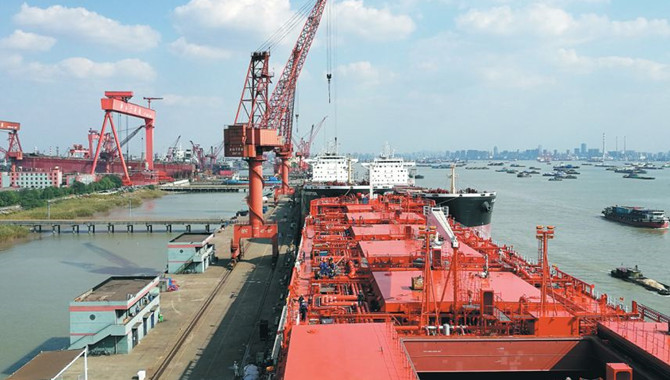[Photo by Jiang Xueqing/China Daily]
China has overtaken Greece to become the world's largest ship-owning country in terms of gross tonnage, according to information released over the weekend by the Shanghai-based China Shipowners' Association.
Citing data from Clarksons Research, a leading provider of data and intelligence for global shipping based in the United Kingdom, the association said the fleet of Chinese shipowners has reached 249.2 million GT, accounting for a global market share of 15.9 percent, or about $180 billion in fleet value.
This is slightly higher than the 249 million GT of Greek shipowners' fleet, which accounts for a global market share of 15.8 percent and is valued at around $163 billion.
Japan ranks third with a fleet of 181 million GT, followed by South Korea and the United States, both at around 66 million GT.
Stephen Gordon, an analyst at Clarksons Research, explained that China's growth in terms of gross tonnage of its fleet shouldn't come as a surprise, given the country's formidable cargo scale, well-developed shipbuilding industry and increasingly active financial sector.
Although China has taken the lead in terms of gross tonnage, which is a nonlinear measure of a vessel's overall internal volume, Greece still maintains the lead in terms of deadweight tonnage, which measures the total weight a ship can carry.
The European country currently holds a significant portion of the market with a deadweight tonnage of 423 million, accounting for 18 percent of the world's total, according to Clarksons Research. Greek shipowners are also competitive in sectors such as oil tankers, liquefied natural gas carriers and bulk carriers.
Noting that Chinese shipowners are highly active in the new shipbuilding market, Gordon said the order volume currently held by Chinese shipowners is nearly double that of Greek shipowners. They are also deeply involved in the buying and selling of secondhand vessels.
Viewed by region, the gross tonnage of Asian shipowners' fleet had surpassed that of European shipowners in 2019, and this gap has continued to widen, according to Gordon. The trend indicates that the center of the global shipping business is shifting from Europe to Asia, market observers said.
Dong Liwan, a professor of shipbuilding at Shanghai Maritime University, said that many Chinese companies have expedited the retirement of their older vessels with high fuel emissions, choosing to acquire new and advanced ships to meet requirements of the International Maritime Organization to help cut carbon emissions in the global shipping business.
Hence, dual-fuel engines and engines that utilize liquefied natural gas or liquefied petroleum gas have gained significant traction among Chinese shipowners, Dong said.
Li Muyuan, executive vice-president of the China Container Industry Association in Beijing, said that it is noteworthy that China's shipowners still have room for advancement. They currently hold the world's top market share at 15.9 percent, but this figure remains relatively modest considering the country's sheer volume of foreign trade, Li added.
Source:
China Daily
The opinions expressed herein are the author's and not necessarily those of The Xinde Marine News.
Please Contact Us at:
media@xindemarine.com


 Ningbo Containerized Freight Index Weekly Commentar
Ningbo Containerized Freight Index Weekly Commentar  Ningbo Containerized Freight Index Weekly Commentar
Ningbo Containerized Freight Index Weekly Commentar  Ningbo Containerized Freight Index Weekly Commentar
Ningbo Containerized Freight Index Weekly Commentar  BIMCO Shipping Number of the Week: Bulker newbuildi
BIMCO Shipping Number of the Week: Bulker newbuildi  Ningbo Containerized Freight Index Weekly Commentar
Ningbo Containerized Freight Index Weekly Commentar  Ningbo Containerized Freight Index Weekly Commentar
Ningbo Containerized Freight Index Weekly Commentar